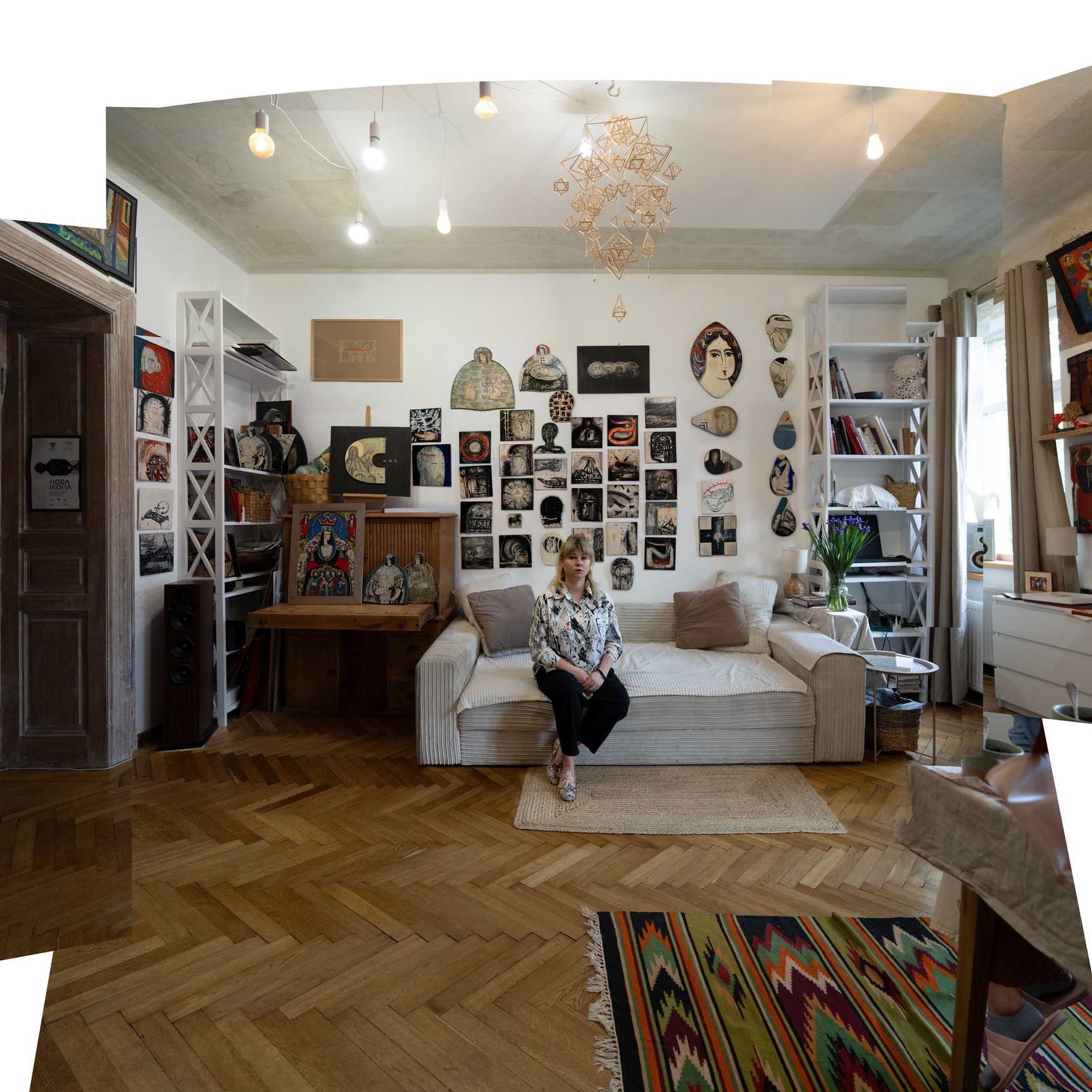Уляна Нищук
Ulyana Nyshchuk
«У повсякденному хаосі війни важливо зберігати високий рівень самодисципліни, він дозволяє залишатися продуктивною навіть за межами рідного дому».

З серії «Before the Future», 2025
Друк на Hahnemuhle Photo Rag Metallic, Dibond
Війна застала іконописицю Уляну Нищук у статусі, знайомому багатьом українкам – статусі матері, яка відповідає за безпеку своїх дітей у світі, що раптово втратив опору.
Повномасштабне вторгнення принесло із собою розлуку з чоловіком, який служить у ЗСУ, а з цим страх та емоційне виснаження. Рішення виїхати до Польщі було пошуком безпеки для дітей. Але разом із фізичною безпекою з’явилося відчуття глибокої тимчасовості, неможливість планувати на довготермінову перспективу, відсутність впевненості у майбутньому. Усвідомлення того, що все може зникнути в будь-який момент, стало частиною щоденного буття і найбільшим страхом Уляни.
Досвід постійного психологічного навантаження, потреби бути сильною для інших, тривала розлука з близькими – усе це сформувало новий внутрішній ландшафт. Робота в майстерні перетворилася на єдиний простір стабільності. Внутрішні зміни супроводжувалися новими емоційними станами, в яких творчий процес виконував терапевтичну функцію: запобігав емоційному вигоранню, допомагав долати страх.
Її ікони також змінилися. Замість яскравих барв – чорно-білі композиції, графічні контрасти, червоний і чорний як кольори відчаю, сили, молитви, пролитої крові. У цих роботах зникає межа між особистим і сакральним. Ікона вже не лише духовний образ, а простір жіночої присутності в часі війни. Уляна працює в класичній техніці левкасу, зберігаючи традицію, але відкриваючи її для сучасної рефлексії.
У повсякденному хаосі війни важливо зберігати високий рівень самодисципліни, він дозволяє залишатися продуктивною навіть за межами рідного дому. Робота продовжується, зокрема за кордоном. Виставки проходять в Україні, Італії, Польщі, Німеччині. Вона сама готує, пакує, контактує з мистецькими просторами, представляє роботи. Українки сьогодні перебувають під додатковим тиском обов’язків. Зараз це не лише підтримка близьких, а й збереження зв’язку поколінь.
Найважливішим особистим досвідом цього періоду стало усвідомлення цінності близьких людей і спільних моментів – тих, що здаються буденними, але насправді наповнені глибиною й сенсом. Короткі зустрічі за кавою, розмови без поспіху, спільна тиша чи сміх – усе це набуло нового значення, особливо на тлі постійної невизначеності та крихкості часу. Це відчуття близькості дає віру в майбутнє і сили не здаватися.
‘In the daily chaos of war, maintaining a high level of self-discipline is essential. It’s what allows me to stay productive — even far from home.’
The war found icon painter Ulyana Nyshchuk in a familiar position for many Ukrainian women — motherhood, and the responsibility of ensuring her children’s safety in a world that had suddenly lost all stability.
The full-scale invasion brought separation from her husband, who serves in the Armed Forces of Ukraine. Alongside that came fear and emotional exhaustion. Her decision to leave for Poland was driven by the need to secure physical safety for her children. But that security came at a cost: a lingering sense of impermanence, an inability to plan long-term, and a loss of confidence in the future. The awareness that everything could vanish in an instant became a daily companion — and her greatest fear.
This ongoing psychological burden, the constant need to remain strong for others, and the extended distance from her loved ones together formed a new internal landscape. Her studio became the only space of stability. Within this space, the act of creation became therapeutic — a way to prevent emotional collapse and to process fear.
Her icons changed too. Where once there were vibrant hues, now came stark contrasts: black and white compositions, deep reds and dark shades standing in for despair, strength, prayer, and blood — the boundary between the sacred and the personal disappeared. The icon was no longer solely a spiritual image — it became a vessel of female presence in wartime. Ulyana continues to work in the classical levkas technique, preserving tradition while opening it up to contemporary reflection.
In the chaos of war, discipline became her anchor. It’s what allows her to remain productive — even outside her homeland. Her work continues, including exhibitions abroad. Her icons have been shown in Ukraine, Italy, Poland, and Germany. She packs the works herself, handles the logistics, and communicates with galleries. Ukrainian women today are under immense pressure — not only to support their families but also to preserve generational memory.
The most profound personal realisation of this period has been the rediscovery of the value of closeness — of shared moments with loved ones. The ones that seem mundane but are, in fact, full of meaning. A coffee shared in peace. A slow conversation. Quiet presence. Laughter. These moments have taken on new weight, especially against the backdrop of constant uncertainty and the fragility of time. It is this sense of closeness that gives her strength — and faith in the future.